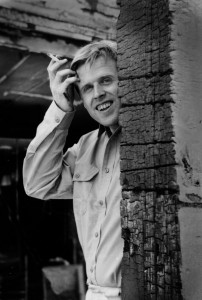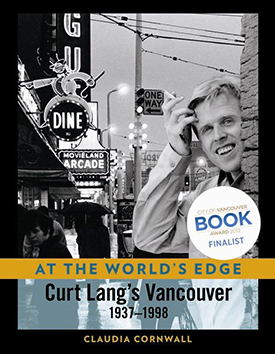Will the real Curt Lang please stand up?
 Curt was a beatnik poet, painter, photographer, beachcomber, boat builder, fisherman, and software entrepreneur. He was born in Vancouver in 1937 and died there in 1998. He and Freddy Douglas were known as the two hippest guys in Vancouver during the late fifties and sixties. This book is my portrayal of Curt and the wild and crazy scene that swirled around him. It will be published by Mother Tongue Publishing in the fall of 2011.
Curt was a beatnik poet, painter, photographer, beachcomber, boat builder, fisherman, and software entrepreneur. He was born in Vancouver in 1937 and died there in 1998. He and Freddy Douglas were known as the two hippest guys in Vancouver during the late fifties and sixties. This book is my portrayal of Curt and the wild and crazy scene that swirled around him. It will be published by Mother Tongue Publishing in the fall of 2011.
I remember hiking in a forest with Gordon and my two children. He was telling them a story about a Druid wizard called Clang. “Clang” was part of Curt’s email address and the wizard bore some resemblance to Curt. We were climbing higher and higher between the Douglas Firs. A mist hung between the trees. I think the story revolved around a major construction project that the wizard was mounting. There were obstacles, delays, frustration. And then I remember that Gordon was overcome by sadness. He couldn’t continue. “It’s too close to the bone,” he said.
There was something wizard-like about Curt. I think that in an earlier and less sophisticated time, a person like him might very well have been so regarded. A shape-shifter he was. Not only did he transform himself several times during his lifetime, but the people around him saw him in such radically different–wildly different–ways.
“Not much of a ladykiller,” said Don MacLeod, a former bookseller who had known Curt in the sixties. Whereas his cousin, Denise Goodkey, who grew up with him, said, “He was quite a Lothario, you know.” Fred Douglas, an artist and photographer who was also Curt’s best friend explained, “He was like his name ‘courteous,’” But his younger brother, Greg Lang, warned me, “The hardest thing for you to capture will be the malice. That is going to require an act of imagination.” My husband Gordon reflected, “There’s a phrase at the end of Ginsberg’s Footnote to Howl that reminds me of Curt–’The extra brilliant intelligent kindness of the soul.’” However, Bob James, a programmer who had worked with Gordon and Curt had a different impression, “Curt was always disrupting things.” Jim Polson had been a friend of Curt’s in highschool. They had travelled to Europe together and afterwards had drifted apart. “I got fed up with the role playing,” he said. Tod Greenaway was a photographer and artist who had known Curt since the seventies. Curt had helped Tod build a sailboat a few years ago. He assessed him like this. “He was such a mixture of extreme perception and extreme thickness. Lurched from one to the other on a bad day.”
And what do I remember? A lot of details. Curt was a man who liked blackberry pie, apple pie, pumpkin pie, any kind of pie except nut pie. He hated turnips, background music, and weak tea. He liked the English short story writer, Pritchett, and he admired Virginia Woolf and a Nigerian writer, Amos Tutuola. He was amused by Spike Milligan and the schlock science fiction movies directed by Ed Wood. He read Thucydides. He was learning ancient Greek and he built himself a pedal canoe that could go like the wind. He liked baths. And he toyed with the idea of making over-sized arm chairs out of foam rubber. He wanted them to look like the furniture in an old comic strip which featured a lazy fast talking character known as Major Hoople. Once he tried to make a helium suit that would allow him to leap into the air as effortlessly as the astronauts did when they strode about the moon. He didn’t like Christmas. He referred to children as “short people” and he winced when they fought. He used to talk about the berserkers–wild Norse warriors who fought with a frenzied fury known as the beserker rage. He said they would gnaw on their shields and weep while waiting for the battle to begin. He was interested in the different ways in which the Greek god Hermes was depicted–especially the different hats he wore. A couple of months before he died he gave his friends garlic peelers as a parting gift. He could talk to anybody. He was tidy. He kept his rooms cold. He liked bentwood cane chairs. He neglected his van. He had published poetry and his name was on three patents. He loved parties but hardly ever took a holiday. He co-authored a book about publishing on the Internet and published a dictionary of Chinook jargon. He met Robert Graves and Lawrence Ferlinghetti. He gave a presentation at the General Motors Research Institute. He had small hands and blue eyes. He was 5’ 10” tall. He was married twice. He liked blue and white Chinese bowls with fish painted on the bottom and chewy white bread. But this is not all.
I am very interested in hearing from people who might have stories about Curt, or pictures of him, or paintings by him. If you have material you would like to share, please email me, Claudia Cornwall, at cm_cornwallATtelus.net




My high forehead wrinkled upon reading my quote. It sounds like I’m whinging, but it was actually said in appreciation. Curt and Fred were very caustic, nasty, funny, and yes, malicious (in a Wildeian or Levantian way). Usually, the target would be an artist or writer whose work they considered feeble and contemptible.
I must disagree with MacLeod — Curt could be catnip for the girls.
The laundry list at the beginning could also include musician, welder, draftsman, loftsman, book-trader, and industrial designer.
Hi Greg,
I was lucky enough to interview John Newlove before he died. He said that “if Curt thought someone was full of bullshit, it was like having your throat slit by an epigram” Perhaps that’s the kind of malice you had in mind!
Always appreciate your thoughts…
Claudia
Did I really use the term Lothario? Seems a bit extreme, but he certainly did attract women.
One of the things I thought was remarkable about him was that he seemed to be able to focus so thoroughly on whatever interested him at the moment…to block everything else out and really study the subject, for hours, days, or weeks until he had mastered it ( once it was Japanese art ). Whatever was his passion at the moment consumed him. He talked….and talked lots…about it and never seemed to notice that the eyes of his audience a had long-since glazed over.
Greg is right: Curt and Fred were very clever at being nasty about things/people they disdained. When I was in my teens, I was shocked by some of the things I heard them say about people, but I soon toughened up and got a kick out of them.
Hi Denise,
Yes, that is a part of Curt that is hard for me to visualize. He didn’t pull his punches, but when I knew him, he didn’t go out of his way to antagonize people either. Older and wiser I guess.
Claudia
Claudia,
Thanks for that. I met Curt twice, I think, but spent a lot of time with him on the phone. I worked for a company that (sort of) worked with Greg’s employer Evergreen Technologies, with which Curt had a relationship of unclear definition. I didn’t know him well enough to fit into your narrative, but one story that stands out, for some reason: I recall once Curt was at a payphone (this was about 1985 or -86) on the street in Vancouver and he called to talk to me. I don’t recall the first few sentences but within a minute, he asked me, “Have you seen the SEE editor?” This was a little ~30KB text editor, sort of similar to the Unix vi, but more capable. At the time, I hadn’t seen it. For some reason, he was enamored of the thing, and he went on in a way you could only call passionate–about a text editor. I’m going to guess that this would seem wacko to anyone who didn’t know Curt, but if you did, it wouldn’t need much more explanation. BTW, I was (and am still) near Chicago in those days. Thanks for your memories. As I said to Greg back then, I wished I had spent more time with Curt. -Barry Wallis
Hi Barry,
Your story resonates with me. I certainly recognize Curt in it. I was talking to an artist today who knew Curt in the sixties. He said, “You know, Curt wasn’t wishy washy!” He was not!
Thanks for your thoughts.
What’s on your mind? Dear Claudia Here is what I just wrote on face book:
I have been reading “At the World’s Edge… Curt Lang’s Vancouver” recently published by Mother Tongue Press. It is an interesting read which is mainly a biography (with some authorial intrusions). Curt was a computer genius, writer, inventor and artist who lived here in Vancouver from 1937 to 1999. The author, Claudia Cornwall, gives an interesting description of Curt’s life and some important aspects of the life of the mind as it could be found here in Vancouver. There are some inaccuracies in the book but the author is to be congratulated on her extensive research and the important but forgotten information that she has unearthed.
Hi Judith, Glad you are enjoying the book, it was an interesting project. Be interested to know what the inaccuracies are?
In some ways, it was like digging up fossils, and piecing together a picture, so much of this life is forgotten and unrecorded, or just plain hard to dig up. I heard, for instance, that Fred gave a party for Ferlinghetti and that Jack Wasserman wrote a column about this, and I searched and searched and searched for that column, but could not find it! Very frustrating!
Anyway thanks for your thoughts!
Claudia
I arrived in Vancouver from T.O. in 1970 and within a couple of years had met Curt through friends at the Cecil. He used to drop by the house I lived in with friends at 6th and Hemlock. Curt and I were friendly but it was also the height of “women’s lib” (as it was quaintly called then) circa 1972, and Curt had no patience for THAT. There were lots of interesting discssions at the Cecil and in various living rooms, then I got to know him better when we went out together in the summer of 1980. Our mutual friend Bob Haxton was our connection, and I think Jamie Reid.
And yes – the tea was strong. And it had to have Carnation canned milk, and lots of sugar cubes.
I was distressed when I leanred he had died, as we had lost touch.
NR.
Hi Nancy,
I remember that when Gordon was working for Curt, he had to hire a programmer and the most qualified candidate was a woman. Curt was deeply suspicious, thought that it was best if programming was conducted as some sort of monastic order, no women in! But he bowed to ‘modern’ ways, she was hired and worked out really well…. Thanks for your thoughts! Claudia
Hi Claudia It is interesting to again run into this blog a year after my face book comments. I am sorry at this point I can’t remember what these small points were. In general I was very impressed by the book. My impressions of Curt at the time when I met him (in the early ’60’s)were somewhat different than how you indicate him to have been at that time. In those days I was very impressed by his intellectual abilities. I was very excited by his information on and interest in Benjamin Worf as I had heard about him when I was a teenager in Saskatchewan through the work of Harold Innis and others. Generally the ideas that he and Fred Douglas had in those days about art, literature, linguistics and history were what fascinated me at that time as well as their very impressive conversational abilities and their artistic practices. So I didn’t really see the more sensational aspects of Curt’s life that you have some times indicate4d in your book. Nevertheless you do talk about his intellectual side and especially about what forms it emerged in later and your description of his ideas at a later time is especially worthwhile I thought. How history is written and rewritten is an amazing process which I really had no understanding of until it started to happen to me. I think that you are to be congratulated on how well you have done. Writing history is a very complex process and I much appreciate the even-handedness and vitality of your project.
Hi Judith,
One of the things that was interesting for me in writing this was that it took place in two stages. I wrote a lot of the book shortly after Curt died, and then re-wrote it and added more ten years later. I think having both perspectives was very helpful. I’m glad I worked on it while my impression of Curt was still vivid and fresh and then later when I had more context and perspective. Gordon and I still miss him–his liveliness, curiosity, and surprising breadth of knowledge. He was always a lot of fun to have over for dinner! I’d really be interested in his comments on the exhibit of his photos that Bill Jeffries has assembled at SFU!
12.5.8
Writing a biograph is always a difficult job as the author wants to produce both a satisfyingly coherent work and yet still wants to include at least some of the ferment that makes a persons interesting. Thus this book on Curt Lang is an impressive achievement. How ever after reading this book and thinking about it for a few months I find that I think that a few more things need to be said about Curt to ill in the picture of him a bit more.
When Claudia Cornwall phoned me and asked if I had any stories to tell about Curt Lang. I thought she asked me for humorous, sensational and outrageous stories. I don’t have a quote of this request so I will have to let this go with my memory. So I had to say that I didn’t have any stories like that. I could remember quite a lot of funny things said by Curt but they usually depended on the immediate circumstances and that takes a lot of time or a huge gift for humor to set them up and I didn’t see how I could really indicate the energy of Curt’s very quick wit.
As for the sensational aspects of Curt’s life I didn’t really remember any. And if I did I wouldn’t see any reason to write them down especially without first giving the story of Curt a very big frame work of what he was for me, which was a very interesting and lively intellectual. Curt read voraciously and he had knowledge of and an opinion on almost any important idea or major event in that present day western oriented world.
So that was what interested me about Curt: the knowledge and intellectual inspiration that I got from him.
As an example of how Curt contributed to the intellectual life in Vancouver I would first contribute the fact that Curt love to talk to any body about anything. And then secondly I must mention how much Curt was interest in Benjamin Worf. Curt had Worf’s book Language, Thought and Reality and he loved to introduce any one who was interested in such ideas to this book. In those days, around the end of the 50’s and in the early part of the 60’s, we were very interested in finding ways beyond the existential conundrums. Curt’s love of Benjamin Worf was one of the bright lights at that point. Linguistic and cultural relativism and the discoveries of the ideas locked into the very structures of language were a phenomenally stimulating way to get beyond the intellectual paradoxes we found in our selves locked into at that point.
Curt’s interest wasn’t just academic, although his skill at analysis was very capable of working with academic discipline. But also he could and often did relate these philosophical ideas to current and present day events as well as to other philosophical, aesthetic or political ideas. He was a person interested in examining questions rather than settling into a cage of closed-ended answers. He was involved in an on-going dialog with thought.
And to talk about Curt without talking about Fred in those days misses a great deal of what they both were. They had such a lively conversation going on between them covering endless vistas of speculation that one without the other for me sadly misses the breadth of their usually humorous interchange.
This is just a suggestion of where else one might look for Curt in as much as one can look for some one who is already dead.
And now I can hear Curt saying, “If you don’t mind me asking Judy, how can one look for someone who is dead?”
Hi Claudia It was a fascinating evening last night. I am sorry if my comments had a disturbing effect. You are right, Curt was many things to many people. I am so glad you wrote that book and that Mona Fertig published it. Curt and Freddy were such interesting people. Hardly anyone seems to have time to talk anymore and few people have their breadth of knowledge and curiosity. I loved your quote from Tod Geenaway. If I get time, when I find it in the book I will post it here. It is about how interesting it was to listen to Curt with his knowledge (for example)of Greek orthography, old Chinese poetry, the strange nature of gallium and his(Curt’s) all night conversation with Noam Chomsky. I am so glad you spent so much effort and time producing this book. It feels to me as if adds much to the life of this city.
Curtis and I were childhood playmates. Every decade or so we would run into each other and exchange terse updates.
Just a simple statement that I’ve just read Curt Lang’s Vancouver for the second time. I bought it on my last visit to Vancouver at the end of September this year, and it is beside me now on my desk here in Norwich, England. I picked it up in Macleod’s on a tipping-it-down day, never having heard of Curt, but intrigued, somehow. I’ve not been disappointed. He’s someone who should be in a novel. Give me time.